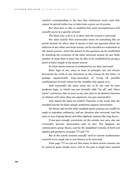reached—corresponding to the fact that statements must exist that cannot be proved either true or false from a given set of axioms.
But what does it take to establish that such incompleteness will actually occur in a specific system?
The basic way to do it is to show that the system is universal.
But what exactly does universality mean for something like an axiom system? In effect what it means is that any question about the behavior of any other universal system can be encoded as a statement in the axiom system—and if the answer to the question can be established by watching the evolution of the other universal system for any finite number of steps then it must also be able to be established by giving a proof of finite length in the axiom system.
So what axiom systems in mathematics are then universal?
Basic logic is not, since at least in principle one can always determine the truth of any statement in this system by the finite—if perhaps exponentially long—procedure of trying all possible combinations of truth values for the variables that appear in it.
And essentially the same turns out to be the case for pure predicate logic, in which one just formally adds "for all" and "there exists" constructs. But as soon as one also puts in an abstract function or relation with more than one argument, one gets universality.
And indeed the basis for Gödel's Theorem is the result that the standard axioms for basic integer arithmetic support universality.
Set theory and several other standard axiom systems can readily be made to reproduce arithmetic, and are therefore also universal. And the same is true of group theory and other algebraic systems like ring theory.
If one puts enough constraints on the axioms one uses, one can eventually prevent universality—and in fact this happens for commutative group theory, and for the simplified versions of both real algebra and geometry on pages 773 and 774.
But of the axiom systems actually used in current mathematics research every single one is now known to be universal.
From page 773 we can see that many of these axiom systems can be stated in quite simple ways. And in the past it might have seemed




